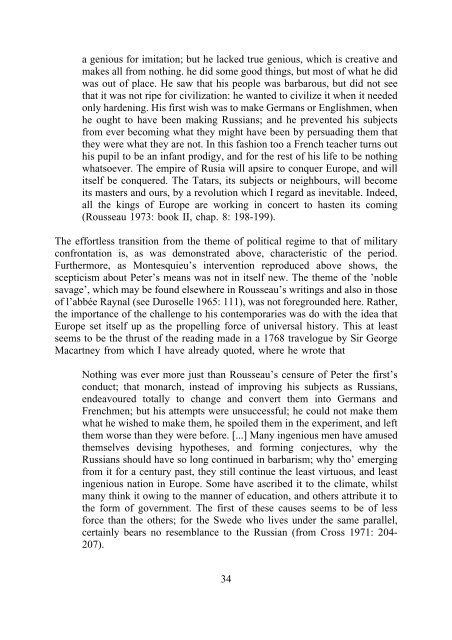RUSSIA AS EUROPE'S OTHER Iver B. Neumann European ...
RUSSIA AS EUROPE'S OTHER Iver B. Neumann European ...
RUSSIA AS EUROPE'S OTHER Iver B. Neumann European ...
You also want an ePaper? Increase the reach of your titles
YUMPU automatically turns print PDFs into web optimized ePapers that Google loves.
a genious for imitation; but he lacked true genious, which is creative and<br />
makes all from nothing. he did some good things, but most of what he did<br />
was out of place. He saw that his people was barbarous, but did not see<br />
that it was not ripe for civilization: he wanted to civilize it when it needed<br />
only hardening. His first wish was to make Germans or Englishmen, when<br />
he ought to have been making Russians; and he prevented his subjects<br />
from ever becoming what they might have been by persuading them that<br />
they were what they are not. In this fashion too a French teacher turns out<br />
his pupil to be an infant prodigy, and for the rest of his life to be nothing<br />
whatsoever. The empire of Rusia will apsire to conquer Europe, and will<br />
itself be conquered. The Tatars, its subjects or neighbours, will become<br />
its masters and ours, by a revolution which I regard as inevitable. Indeed,<br />
all the kings of Europe are working in concert to hasten its coming<br />
(Rousseau 1973: book II, chap. 8: 198-199).<br />
The effortless transition from the theme of political regime to that of military<br />
confrontation is, as was demonstrated above, characteristic of the period.<br />
Furthermore, as Montesquieu’s intervention reproduced above shows, the<br />
scepticism about Peter’s means was not in itself new. The theme of the ’noble<br />
savage’, which may be found elsewhere in Rousseau’s writings and also in those<br />
of l’abbée Raynal (see Duroselle 1965: 111), was not foregrounded here. Rather,<br />
the importance of the challenge to his contemporaries was do with the idea that<br />
Europe set itself up as the propelling force of universal history. This at least<br />
seems to be the thrust of the reading made in a 1768 travelogue by Sir George<br />
Macartney from which I have already quoted, where he wrote that<br />
Nothing was ever more just than Rousseau’s censure of Peter the first’s<br />
conduct; that monarch, instead of improving his subjects as Russians,<br />
endeavoured totally to change and convert them into Germans and<br />
Frenchmen; but his attempts were unsuccessful; he could not make them<br />
what he wished to make them, he spoiled them in the experiment, and left<br />
them worse than they were before. [...] Many ingenious men have amused<br />
themselves devising hypotheses, and forming conjectures, why the<br />
Russians should have so long continued in barbarism; why tho’ emerging<br />
from it for a century past, they still continue the least virtuous, and least<br />
ingenious nation in Europe. Some have ascribed it to the climate, whilst<br />
many think it owing to the manner of education, and others attribute it to<br />
the form of government. The first of these causes seems to be of less<br />
force than the others; for the Swede who lives under the same parallel,<br />
certainly bears no resemblance to the Russian (from Cross 1971: 204-<br />
207).<br />
34

















